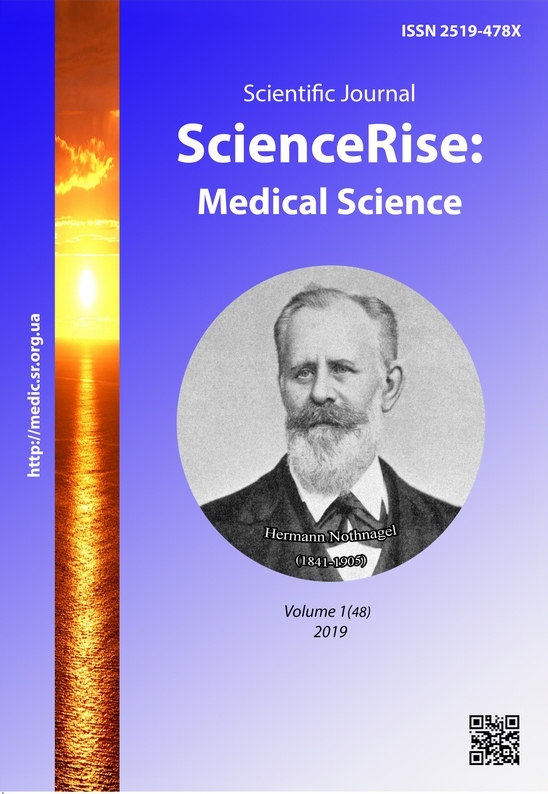Current features of formation of alcohol dependence on men as the basis of their rehabilitation
DOI:
https://doi.org/10.15587/2519-4798.2019.155670Keywords:
alcohol dependence, motives for using alcohol, stress disorder, coping strategies, risk factors, component of intoxicationAbstract
Aim of the work. To study modern psychological and clinical-psychopathological features of the formation of alcohol dependence in men as a basis for their rehabilitation.
Materials and methods. The study carried out a comprehensive clinical-psychopathological and psychodiagnostic survey of 150 male patients aged 20 to 55 years, in which according to the diagnostic criteria of the ICD-10, a syndrome of alcohol dependence was established. 94 patients were treated at the Kharkiv Regional Clinical Narcological Hospital No. 9, and 56 patients at the Clinic of Psychiatry and Narcology of the Military Medical Clinical Center of the Northern Region.
Results of the research. In 35.2±1.5% of civilian patients and 40.2±1.9% of military men, interspersed with the domination of the dysphoric-explosive component, in 43.5±2.1% and 35.1±1.6 % of alcohol dependent, respectively, anxiety-depressive component in 21.6±1.1% of civilian and 24.7±1.4% of military aggressive component of intoxication.
For civilians, the main motive for alcohol abuse was "for a company", "to support a friend", "a desire to obtain physical and psychological satisfaction from the action of alcohol". For the military, the main motive was to "eliminate combat stress," "drown out pain", "to get rid of important military memories", "the desire to level off with alcohol, negative emotional experiences (tension, anxiety, fear, anguish)".
In the surveyed soldiers with alcohol addiction there is a complete and obvious manifestation of stress disorder, compared with civilians who have a slight manifestation and lack of traumatic stress.
The surveyed patients are dominated by non-constructive forms of coping strategies.
Based on the data obtained during the work we systematized modern predictors of the formation of alcohol addiction in men in modern conditions, which are considered as targets of psycho-correction and psycho-educational effects in the construction of the system of rehabilitation of patients.
Conclusions
1. Clinical and psychopathological features of the formation of alcohol dependence in men, in the aspect of their rehabilitation, are specific depending on the predominant personally significant motives of alcohol use, loss of situational control, dysphoria, affective reactions, anxiety and depressive disorders.
2. Pathological psychological predictors of the formation of alcohol addiction in men are the effectiveness of behavior, conflict, the prevalence of non-constructive forms of coping strategies. The main factor of the risk of alcohol dependence in the military is a complete and obvious manifestation of stress disorder
References
- Haponov, K. D. (2016). Alkoholna zalezhnist v umovakh sotsialnoho stresu: epidemiolohichni, klinichni i likuvalni aspekty. Ukrainskyi visnyk psykhonevrolohii, 24 (4 (89)), 54–60.
- Voloshin, P. V., Maruta, N. O. (2017). Osnovni napryamki naukovih rozrobok v nevrologiyi, psihiatriyi ta narkologiyi v Ukrayini. Ukrains'kii vіsnik psihonevrologіі, 25 (1 (90)), 10–18.
- Linskiy, I. V., Minko, A. I., Artemchuk, A. F., Grinevich, E. G., Markova, M. V., Musienko, G. A. et. al. (2009). Metod kompleksnoy otsenki addiktivnogo statusa indi- vida i populyatsii s pomoschyu sistemyi AUDIT-podobnyih testov. Visnik psihiatriyi ta psihofarmakoterapiyi, 2 (16), 56–70.
- Minko, O. I., Lisna, N. M., Markozova, L. M. (2018). Indyvidualno-psykholohichni osoblyvosti osib z alkoholnoiu zalezhnistiu ta yikh spivzalezhnykh rodychiv, yaki vplyvaiut na formuvannia terapevtychnoho aliansu. Ukrainskyi visnyk psykhonevrolohii, 26 (3 (96)), 39–42.
- Sosyn, Y. K., Chuev, Yu. F. (2010). O narkolohycheskoi sytuatsyy v Ukrayne. Ukrainskyi visnyk psykhonevrolohii, 18 (3 (64)), 174.
- Detsyk, O. Z., Karpinets, I. M. (2013). Kompleks zakhodiv profilaktyky alkoholizmu na rivni pervynnoi medychnoi dopomohy. Aktualni pytannia farmatsevtychnoi i medychnoi nauky ta praktyky, 1 (11), 76–79.
- Pohorecky, L. A. (1991). Stress and Alcohol Interaction: An Update of Human Research. Alcoholism: Clinical and Experimental Research, 15 (3), 438–459. doi: http://doi.org/10.1111/j.1530-0277.1991.tb00543.x
- Gaponov, K. D. (2018). Alkogolna zalezhnist i sotsialniy stres: biohimichni, neyrofiziologichni i psihosotsialni mehanizmi vzaemovplivu (oglyad literaturi). Ukrains'kii vіsnik psihonevrologіі, 26 (1 (94)), 120–121.
- Agibalova, T. V., Petrosyan, T., Kuznetsova, A. et. al. (2013). Osobennosti formirovaniya, techeniya i terapii zavisimosti ot alkogolya u patsientov s posttravmati ches kim stressovyim rass tr oystvom. Zhurnal nevrologii i psihiatrii, 6 (2), 33–38.
- Dudko, T. N. (2007). Reabilitatsiya narkologicheskih bolnyih (reabilitologiya i reabilitatsionnyie kontseptsii). Psihiatriya i psihofarmakoterapiya, 9 (1), 13–17.
- Slobodyanyuk, P. M. (2011). Zasadi ta naukove obgruntuvannya printsipiv i pidhodiv schodo formuvannya sistemi integrativnoyi psihoterapiyi alkogolnoyi zalezhnosti. Ukrains'kii vіsnik psihonevrologіі, 19 (2 (67)), 92–96.
Downloads
Published
How to Cite
Issue
Section
License
Copyright (c) 2019 Vasyl Lytvynenko

This work is licensed under a Creative Commons Attribution 4.0 International License.
Our journal abides by the Creative Commons CC BY copyright rights and permissions for open access journals.
Authors, who are published in this journal, agree to the following conditions:
1. The authors reserve the right to authorship of the work and pass the first publication right of this work to the journal under the terms of a Creative Commons CC BY, which allows others to freely distribute the published research with the obligatory reference to the authors of the original work and the first publication of the work in this journal.
2. The authors have the right to conclude separate supplement agreements that relate to non-exclusive work distribution in the form in which it has been published by the journal (for example, to upload the work to the online storage of the journal or publish it as part of a monograph), provided that the reference to the first publication of the work in this journal is included.









